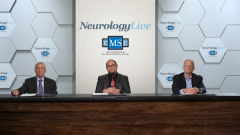
Practical Considerations to Manage Patients With MS and Cognitive Impairment
Experts in neurology discuss practical considerations for the management of multiple sclerosis, tying in the importance of a collaborative care team and patient involvement.
Episodes in this series

Ahmed Obeidat, MD, PhD: Practically in the clinic, now if we have a patient with MS [multiple sclerosis] who may have a relapse or new lesions forming in MRIs [magnetic resonance imaging scans], we tend to switch treatment sometimes, right?
Randall Schapiro, MD, FAAN: Absolutely, you should.
Ahmed Obeidat, MD, PhD: Exactly, we should, exactly. And how about cognitive worsening and this is one of those things, so even if there are no relapses, no new lesions, but their cognition—
Randall Schapiro, MD, FAAN: If it’s that recognizable and—
Ahmed Obeidat, MD, PhD: You would kind of switch classes of medication.
Randall Schapiro, MD, FAAN: Now, it may be that what we’re seeing is the progressive form of MS with the axonal loss that’s occurring, and not so much inflammation because these immune drugs all seem to work mostly on inflammation—
Ahmed Obeidat, MD, PhD: Inflammation, yes.
Randall Schapiro, MD, FAAN: —really, and maybe BTK [Bruton tyrosine kinase] Inhibitors will change our thought, but I’m not ready to go there yet. And thus, changing medicine may not be the answer, but I think if somebody is worsening, we look at relapse rate and we look at disease progression. and that’s part of disease progression, and we look at the MRI, and those are what makes us decide. Now, each person’s an individual.
Jeffrey Wilken, PhD: And unfortunately, it depends where the neurologist is, where the neurologist practices, that sometimes the cognition is not included in that progression metric that you’re talking about.
Randall Schapiro, MD, FAAN: It should be.
Jeffrey Wilken, PhD: It should be, and it’s starting to become more common, and I’m starting to see the education kind of get out there, but again, it’s hard to ask about. Like you said, people don’t want to leave depressed. It’s hard to get a good gauge of it, but as we’re starting to hear more and more about potential screens that can be used or ways to ask that are a little less depressing.
Randall Schapiro, MD, FAAN: Cognition and sexual function are two topics that are —you have to ask, and you have to do it, but you have to have rapport at the same time you do it.
Ahmed Obeidat, MD, PhD: That’s exactly right, yes. You mentioned something about the SDMT [Symbol Digit Modalities Test] earlier as a screening tool, but you also spoke now about maybe how to talk to patients about cognition. Are there any hints for neurologists on how can we, maybe, better screen for cognition in our clinics, so we know who we’re going to refer to you?
Jeffrey Wilken, PhD: How should the neurologist ask?
Jeffrey Wilken, PhD: I think it really just comes down to having a discussion. It doesn’t need to be kind of pinpointed, “How are you thinking? How’s your memory?” I mean, that’s the kind of thing we heard from Dr Schapiro that’s going to send a person kind of reeling, right? I think it can be much more subtle than that. “Hey, how’s it going with the kids? You got a lot of responsibilities at home; they’ve got 14 different activities. Are you able to keep up with those activities? At work, are you getting in any trouble kind of doing the multitasking, are you able to finish your assignments that you’ve been doing for years without any problems?” And kind of listening for those subtle changes and, of course, it could be that the person got depressed or is fatigued, but those are the subtle things that we might be dealing with in terms of asking questions and are the kinds of things that we might be kind of looking for. I agree with D. Schapiro, you can’t just go hit the person in the head with “Is your memory impaired now?” I think that that’s just not going to tell us anything anyway
Ahmed Obeidat, MD, PhD: Exactly.
Jeffrey Wilken, PhD: I think what we really want to hear is function. What it really comes down to is “How are you functioning? Is there a change?”
Ahmed Obeidat, MD, PhD: Sometimes, even management of finances, personal finances—
Jeffrey Wilken, PhD: Oh yes.
Randall Schapiro, MD, FAAN: That’s a big tip-off.
Jeffrey Wilken, PhD: I ask every patient, not only finances, paying a bill, different things like that—
Ahmed Obeidat, MD, PhD: Yes, like missing the due dates.
Jeffrey Wilken, PhD: —and “How’s it going with the medicines? Are you forgetting to take your medicines? Are you taking them without any problems, you accidentally leaving the stove on or the oven on or anything like that? When you’re driving, how’s that going? You’re feeling like you’re not quite as quick as you used to be, are you feeling like you’re getting lost at all?” I mean, some of those are more dementia kind of questions, but with some of the more severe MS, you can see some of those.
Ahmed Obeidat, MD, PhD: Sometimes, that has happened. And thus, we’re back in the clinic again and I think for both of you, and Dr. Schapiro, when you see patients in clinic, and you want to give them advice on how to preserve cognition and how to live well with MS and I want to hear your advice to patients. What do you typically tell them so that we can all learn and help us also talk to patients?
Randall Schapiro, MD, FAAN: I tell my patients and I also tell anybody who’ll listen to me whether they’re students or not, that managing MS is about disease management, symptom management, and person management. It’s about those three things. We’ve talked about disease management, with the disease modifying treatments, we have to look at the symptoms management as well, and so, we have to look at the drugs and how they affect cognition and will they affect cognition and getting that and —depression is a symptom, treating depression, and sleep disturbance. They’re symptoms, treating the sleep disturbances, things of that nature. And then, you have to treat that person and that’s the most difficult and most individual thing that you have to do.
And, I think, sometimes, in some individual—depending on their intellectual capacity, and their age, and their educational status—we haven’t said a lot about educational status, but it appears that in the studies, people who have had more education have less cognitive problems because they have some reserve built up from using their brain so much—but, we have to look at that whole picture of things and explain to people that this is a real issue, cognition. It’s not a psychological issue, it’s not an issue that they can just fix by being smarter somehow, that they—that we have to treat the disease, we have to treat the symptoms, and we have to look at you as an individual person and modify your lifestyle to make it work right. And I talk, we’ve been talking about cortical dementias, Alzheimer-type things. Subcortical dementias are more like multiple sclerosis where, there’s retrieval problems and issues with this and that is different from the Alzheimer dementia, and people need to understand that and then they can live with it better, I think.
Ahmed Obeidat, MD, PhD: Hence, role of diet, role of exercise, all these aspects you kind of incorporate these—
Randall Schapiro, MD, FAAN: I wish I could tell you there’s a great diet but what’s most important is that people eat a nutritious diet, that’s really important.
Ahmed Obeidat, MD, PhD: It’s a balanced nutritious—
Randall Schapiro, MD, FAAN: Balanced nutritious diet.
Jeffrey Wilken, PhD: I look at the list serves, and people talk about all kinds of different kinds of diets and the dietitian on that list serve is always saying, “Well, you just got to eat healthy.”
Randall Schapiro, MD, FAAN: All of us do.
Jeffrey Wilken, PhD: And you talk about the other —you’re talking about the different aspects of management with the person, I think we need to also consider ways to help with cognition that will include basically using the brain, being active, as we’ve heard before, and making sure that you have a person that is attempting to interact with others. I mean, socialization, important things like that. Then, there’s the role of cognitive rehabilitation. People are learning more about this. Cognitive rehabilitation used to be thought of as something good for just like, stroke and acquired problems that kind of have an end point. They’re not progressive, and if you look at some of the insurances, it will not cover cognitive rehab for progressive illness.
But the fact is, there used to be terrible research on cognitive rehabilitation because everybody had their own program, nobody did something similar, they weren’t replicating their studies, that kind of thing. But if you look at some of the more recent data on cognitive rehabilitation, there’s very good data out there showing that, not only can it be helpful, but it can actually help in terms of cognition, but actually in terms of extending and using the things learned in daily life. You don’t want to just learn —you don’t want to just say you’re doing cognitive rehabilitation on a computer program, where you’re learning to do X, Y, and Z, and you get better at that over time—that’s great, but you want that to externalize into what you’re doing in your daily life and there’s some good research showing now that that is more useful.
Randall Schapiro, MD, FAAN: I am so glad you brought that up actually, Dr Wilken, cognitive rehabilitation is kind of a new and bright field, but I want to mention the role of the speech pathologist in the cognitive rehabilitation as well, because they’re important people in our programs, because they have the time that’s devoted to cognitive rehabilitation. Our neuropsychologist are busy testing people and they’re busy working with people from that standpoint, but concerning the cognitive rehabilitation, the speech pathologists get involved with that and they do a good job.
Transcript Edited for Clarity
Newsletter
Keep your finger on the pulse of neurology—subscribe to NeurologyLive for expert interviews, new data, and breakthrough treatment updates.













